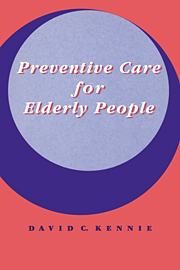Book contents
- Frontmatter
- Contents
- Acknowledgements
- 1 An overall perspective
- 2 What is health in old age?
- 3 The goals of health promotion for elderly people
- 4 A task for everyone
- 5 Critique of strategies
- 6 Cancer prevention
- 7 The prevention of non-cancerous health problems
- 8 Enhancing functional status
- 9 Strengthening support systems
- 10 Summary of problems and strategies
- 11 Tailoring strategies to individuals
- 12 Targeting, screening and surveillance in primary care
- 13 Practical aspects of implementation
- 14 The costs of preventive care and health promotion
- Index
6 - Cancer prevention
Published online by Cambridge University Press: 15 October 2009
- Frontmatter
- Contents
- Acknowledgements
- 1 An overall perspective
- 2 What is health in old age?
- 3 The goals of health promotion for elderly people
- 4 A task for everyone
- 5 Critique of strategies
- 6 Cancer prevention
- 7 The prevention of non-cancerous health problems
- 8 Enhancing functional status
- 9 Strengthening support systems
- 10 Summary of problems and strategies
- 11 Tailoring strategies to individuals
- 12 Targeting, screening and surveillance in primary care
- 13 Practical aspects of implementation
- 14 The costs of preventive care and health promotion
- Index
Summary
Cancer is the second most common cause of death in the elderly population. Table 6.1 shows the annual incidence of the ten most common cancers in England and Wales and the proportions of these cases that occur in men and women aged over 70 and over 80 years. The reasons for the increased rate of cancer in old age is unknown, though it may be due to a decrease in immune surveillance or to an increasing frequency of DNA damage resulting in more frequent malignant transformation of normal cells.
Despite cancer being so common, surprisingly little is known about its behaviour in older patients. Previously, older patients have tended to be excluded from clinical trials because of negative ageist bias, misperceptions about the ageing process or, on occasions, the sheer impracticality of including very frail elderly individuals in such research. Despite this, cancer has been closely scrutinised by the biomedical industry for many years and more is probably known about the prevention of cancer than the prevention of many other health problems in old age.
This chapter therefore reviews the importance of each of the major cancers afflicting the elderly population, evaluates the worth of screening programmes, and makes recommendations for practising clinicians based on current evidence. Where appropriate, comment is also made about primary preventive strategies.
- Type
- Chapter
- Information
- Preventive Care for Elderly People , pp. 36 - 76Publisher: Cambridge University PressPrint publication year: 1993



